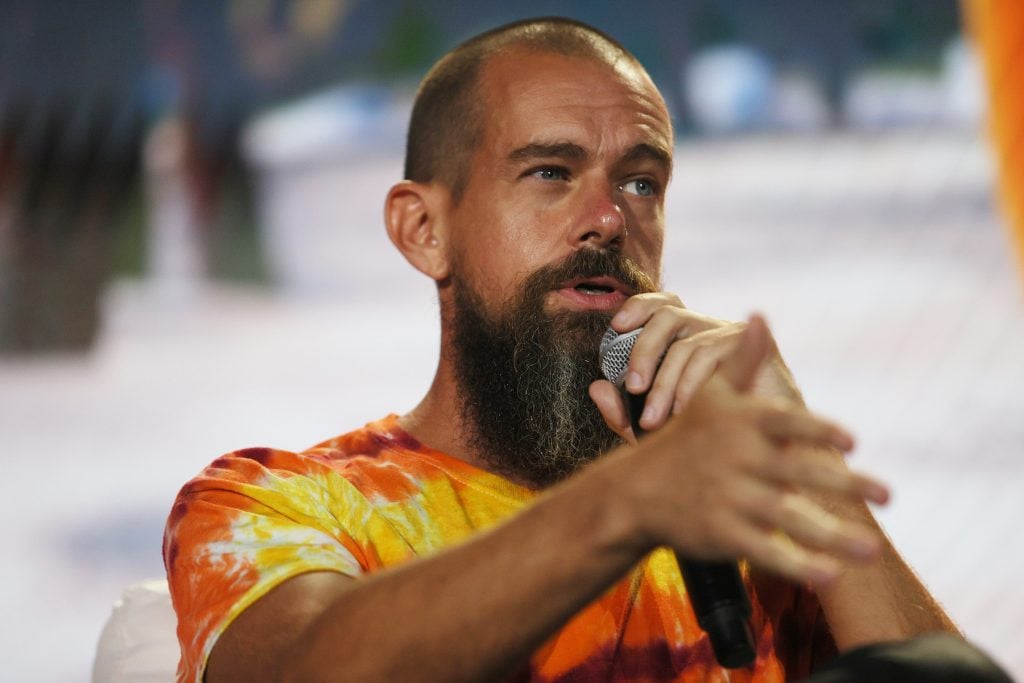NFTs
A Crypto-Collector’s Attempt to Flip the NFT of Jack Dorsey’s First-Ever Tweet—for Which He Paid $2.9 Million—Flops Big-Time
Now he's trying to get Elon Musk to buy it.

Now he's trying to get Elon Musk to buy it.

Ben Davis

Last March, Twitter founder Jack Dorsey made headlines when he minted an NFT connected to his first-ever tweet, featuring the immortal line “just setting up my twttr.” It sold for the equivalent of $2.9 million to blockchain entrepreneur Sina Estavi.
Held in the immediate aftermath of Beeple’s $69 million sale of his Everydays at Christie’s, the Dorsey “first tweet” sale on the platform Valuables was one of a number of high-profile NFT sales that opened the floodgates of public interest. A gold-rush mentality set in, with creators of various internet memes trying their luck at selling off their own NFTs.
The Guardian would write of a new breed of collectors focused on buying pieces of internet history (or, rather, buying blockchain-based certificates pointing to them). As one crypto-art collector told the newspaper: “I honestly think they are decent investments….As we get older, some of the most collectible assets will be the things that our culture values. And that is memes.”
Well, this week, a little more than a year after the original sale, Estavi decided to try his luck at flipping the Jack Dorsey NFT in an auction on OpenSea. His initial asking price was $48 million, according to CoinDesk.
I decided to sell this NFT ( the world's first ever tweet ) and donate 50% of the proceeds ( $25 million or more ) to the charity @GiveDirectly
? https://t.co/cnv5rtAEBQ pic.twitter.com/yiaZjJt1p0— Estavi (@sinaEstavi) April 6, 2022
Estavi wrote in a tweet that he would donate half of the proceeds to the anti-poverty charity GiveDirectly. Dorsey, who had donated all of his original proceeds to the same charity, immediately tweeted at Estavi, “why not 99% of it?”
The point ended up being moot. The sale closed on Wednesday with just seven bids, topping out at 0.09 ETH, or about $277.
Following the disappointment, Estavi told Reuters that he would hold on to the NFT for the moment: “It’s important to me who wants to buy it. I will not sell this NFT to anyone because I do not think everyone deserves this NFT.”
To the BBC, he insisted on its long-term investment value: “Years later, people will realize the value of this NFT. Keep that in mind.”
To be fair to Estavi, interest in the Dorsey NFT has crept up in the days since the botched resale. Bids are now above $10,000, and continue to trickle in.
Estavi, however, does not seem to be inclined to sell something that he has frequently compared to the “Mona Lisa of the digital age” for roughly 1/30th of what he paid. Instead, with Elon Musk’s takeover bid of Twitter making headlines this week, he has been tweeting at the world’s richest man suggesting that he buy it.
It's not good if the owner of the whole Twitter does not own the first tweet 🙂 https://t.co/unNZBpNcg6
— Estavi (@sinaEstavi) April 14, 2022
The attempted sale comes as Estavi struggles to right the ship of his business interests. He announced that he was arrested in Iran shortly after buying the Dorsey tweet last year, on charges of “economic disruption.” (He says he was freed in February.) He has said that any proceeds of the new NFT sale would go to his endeavor Bridge Oracle—a business that, according to CoinDesk, is currently facing intense criticism from holders of its dedicated BRG token, which has cratered in value, as he attempts a highly complex scheme to rescue it.
However, it seems unlikely that Estavi will be able to flip Jack Dorsey’s first tweet at anything close to a profit, now that it has been so publicly burned. Given how visible and symbolic the original Dorsey NFT sale was, Estavi’s bellyflop may have wider ramifications too, making it more difficult for boosters to pitch meme NFTs as a long-term bet.
Who would have predicted that attention spans would be so short when it comes to investing in tweets?